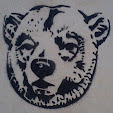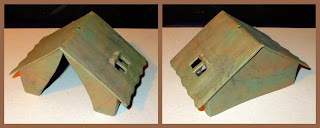But
is it British?
Following the posting of the tent in the 'What The !&*$?' section of Plastic Warrior magazine's issue 173, I wrote the following to the Editor;
I was slightly
surprised to see the request for information on the tent in PW173, as I'd assumed (never assume!)
everyone thought it was Trojan, so I
thought it was Trojan too - still
learning this big-scale malarkey!
I now offer the
possibility it may originate next door in Speedwell's
stable? The colours on mine match the more mixed, marbled Speedwell Germans that came with it?
I also thought Trojan as they list both a red cross
and camouflaged version in their catalogue, and I'm sure I've have seen
plain-white ones (cat. 1134), assuming mine is 'camouflaged' (cat. 1133)?
Might the tent
be one of the either-maker items which plague study of both . . . and others!
Perhaps supplied by Speedwell to Trojan?
Only to be slapped-down with the news that
it was in the big book of Spain and that seemed to be the end of the matter!
Hoovered-up
study material!
Now, there is no doubt that Jecsan (who were revealed in the latest PW; Issue 174, to be the originator) have a number of these tents,
indeed a couple of Google searches have revealed that as a Spanish toy, it's
not even slightly rare, there were lots on Todocolecction last week, both
colours, with and without the 'bedding insert' and all variants.
However in answer to the original question
in PW173; "Does anyone know who made
the military tent, below?" I am going to say, yes; probably Speedwell and/or Trojan.
For the simple reason that it is camouflaged, or at least it is marbled/flecked
with at least three colours in an attempt at camouflage.
But, let's look at the Spanish oeuvre first
to get our bearings and . . .
Grrrreeeeeen,
pure grrrreeeeen!
. . . spot the deliberate mistake - if you
haven't already from the previous image; it would appear the Spanish forgot to
sell themselves any 'camouflaged' ones and shipped them all to Britain, where I
have now seen at least four?
It is a fact that while there may be
marbled ones in Spain, I have yet to find one, but, all the non-white ones I've
seen in the UK (and been told are 'Trojan')
are marbled. At which point I should add that I've seen white ones over here
too, but they are - by design - going to prove harder to ascribe, although I
have a feeling one of them had painted red-crosses?
But the Spanish green ones are flat green,
several shades, from a yellowish-olive green through a darker olive-drab to a
pale-olive, some of which difference may be due to lighting, but that there are
different greens is for sure, however; they are all flat, monotypes.
Whites
Now the white ones - definitely Spanish -
raise several other points, which as I am only proposing a theory here, are
worth looking at, although it's not all that clear and it will take/needs a
Spanish collector to study and annotate them properly.
Most (but not all) the Spanish white tents,
have a thinner window-bar on the open 'vent' window, it also has a more
delicate rolled-up vent-cover relief-sculpting than the 'cheese slab' on the
mouldings with a thicker window-bar (the tent outlined with hatchings -
centre-left). However there is evidence for thin bars on some green ones too,
so there were clearly at least two machine-tools.
I'm not so convinced about the differences
I marked on, for the over-hang wavy-bits, I think it had more to do with angles
of shots and a short-shot moulding (the 'scalloped' one).
Fully
Glazed!
Another major difference between the tool
shots is that some tents have a second window on the back wall of the 'canvas',
a rather fetching dormer-type with six framed panes in two panels meeting in
the centre, and presumably opening and closing - if the carpenter remembered to
put the hinges in!!
One of the things that needs more work (and
if a Spaniard doesn't do it soon, Todocolecction will provide me with
enough evidence to confirm or disprove myself) is the possibility (likelihood?)
than those tents with rear etched-windows are the tents which also have . . .
In a
flap
. . . a straight-edged flap to the left of
the door, as opposed to the more common curved edge, and again, while I think I
saw a green one with rear-window, I couldn't find it on a second search, so for
now it has to be assumed to be a white tent 'thing'.
Comparison
While the other Internet images here today
have been screencaps or crop-outs, I am using this one (on the left) whole for
the legitimate 'research purpose' of comparing with mine. You can see that they
are the same tool, but the Spanish one is a flat green, and poorer-finished,
being both more flashy, and less fettled.
The [UK] one has been cleaned-up, but had
less flash to clean up, to begin with, especially on the four long internal
mould release-pin channels, necessary to push the deep moulding off the male
half of the mould. The strange off-set window cavity (with the thicker bar) is
also the same.
It would seem that there are two tools
identifiable from this early, slightly cursory work, one having the thin window
bar, extra etched window and straight-edge to the door-flap, mostly white, and
one with no second window, a curved flap and a thick window bar, mostly plain
green if found in Spain, often camouflaged if found in the UK.
Different
treatments of the figures
but
both close to the tent's mix.
At this point the theory needs to
speculate! I suspect that if the theory (and there's nothing wrong with a
theory, it remains only a theory until proven or disproven) that Speedwell and/or Trojan are responsible for the UK found camouflage versions is
true; they came after the thin window-bar version had been in production for
some time.
The fact that the thin bars are often
broken, along with the daft window on the rear wall led to the development of the
second version with a more robust window-bar and no rear window, in the
production of which the door-flap was also given a little more 'sag'.
However there may be other versions and I
will continue to pore-over images as they become available!
Now it may be that any UK version is a
straight copy, but I think they may have had first dibs on the new tool, hence
the cleaner castings? The Spanish would have had a stock of the old mostly
(all?) white ones, and switched to the latter version after it was returned -
from the UK?
The reasoning for a relationship is not
hard, there was a lot of mould-swapping back in the day, the whole Trojan/Speedwell and UNA/VP thing has Kentoy behind it, one of the Kentoy
sculptors worked with the Spanish (Reamsa)
. . . draw your own picture; it's only a theory!
Three
colours clearly visible
at
the neatly-trimmed gate-mark
With the addition of a fourth colour (sand)
these Speedwell Germans are
manufactured in a very similar colour-way and the other three colours (oxide-red,
herb-green and black) are a good match - the herb green goes a bit appley where
it mixed with the sand, but on the rifle's four-grip it's the same herby or
pale-jade shade.
Trojan carried two tents in their catalogue, priced to match a stretcher
team (one shilling and sixpence), which would be approximately right for the
amount of plastic in this tent;
- · Cat. 1133 - Camouflaged Tent
- · Cat. 1134 - Red Cross Tent
. . . for which there are no other
candidates, the only likely one I knew-of turned out to be Starlux years ago - a small two-man pup-tent, also marbled but in a
phenolic or styrol polymer!
Also Trojan
- who were (only a few years ago) a barely-understood 'minor make' - have
turned out to be a prolific maker of toys, novelties and plaything's including
flying models of aircraft and gliders, collectors cards, blow-moulds and solid
plastic toy soldiers, with Colin Penn's recent discovery probably also involved and they (Trojan) may
well have had the clout (or 'imagination') to hire-in a Spanish mould.
Some older collectors already thought this
(the camouflaged) tent was Trojan,
but the match being with Speedwell
figures, that makes it a bit murkier. The people from whom I bought mine had
been to the Trojan works back in the
1950's/60's, and large numbers of both Speedwell
and Trojan figures were in that same 'big
purchase'.
They also reported a vat of liquid in the
stables, from which people were taking 'stuff', this is unlikely to be a
polymer (even though the witness though it was - hot plastic, out of its
containment vessel doesn't behave like a liquid, but more like a writhing and
rapidly solidifying snake - or hot blancmange!) so they may also be responsible
for some of the many unknown hollow-cast or solid lead figures in the back of
Joplin's 'Big Book'? Or maybe they were casting components for the model
aircraft?
The real point is that for the theory to
hold until further evidence comes to light, one only has to accept that there
don't seem to be Jecsan camouflaged
versions in Spain, but there are a few in the UK, Trojan had a varied oeuvre and a camouflaged tent in their
catalogue, there's no other obvious candidate for the Trojan tent at the moment
and . . . err . . . that's it.
Speedwell and/or, of/for Trojan
tent via Jecsan? I'm not
saying they ARE, but I am saying they MIGHT be!
Hell -
Jecsan may even have got the tent from the Brit's, they (Speedwell / Trojan) were active in the
1950's, the Jecsan set's which
carried these are dated (by the Spanish) to the 1960's? But that's a
mischievous-thought rather than a serious part of the theory!
19th May 2022 - Now (2022) to be found in the Trojan Special publication as Trojan! I still prefer Speedwell, but there was cross-fertilisation!
Boy
Scout's on manoeuvres
Four very similar mould release-pin marks are
to be seen here on a modern Hong Kong/China tent, again: to help 'pop' the moulding
off the deep male half of the tool. Anyone know whose sets it was found in?













No comments:
Post a Comment